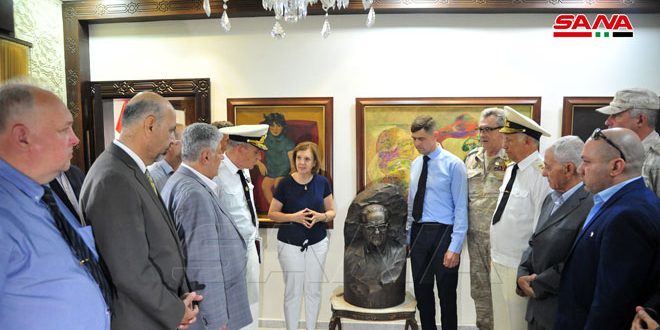Ministry of Culture receives Bronze statue of archaeologist Khaled Al-Asaad from the Veterans Association of Russia
The Ministry of Culture received on Sunday a bronze statue of the archaeologist and the martyr researcher Khaled Al-Asaad presented by the Russian Veterans Association as a souvenir in memory of a person who served Syria’s antiquities and civilization.
Dr. Lubana Mushouh, Minister of Culture in the caretaker government described this initiative, which was launched in coordination with the Russian Writers Union, as an embodiment of the depth of friendship and cooperation between the two peoples, leaderships and armies of the Syrian Arab Republic and the Russian Federation.
“Al-Asaad is a symbol of all the martyrs of Syria, and he is a hero who suffered a lot from the brutality of the criminals who wanted to rob country’s cultural identity and distort its reputation and memory”, the Minister added.
The phrase engraved on the statue that the “palm trees of Syria do not bend” represents all the sons and martyrs of this country.
Dr. Lubana asserted that the statue will occupy a place worthy of it in the Palmyra Museum.
For his part, Admiral Al-Yafi Kavlış Kazlov from the Veterans association said, “The idea of presenting this statue was crystallized by the Association after the martyrdom of the scientist Al-Asaad, who is one of many martyred in Syria in defense of its heritage.”
 He considered that this statue is an expression of the steadfastness of the Syrian people in the face of terrorism, which will be an incentive for generations in learning lessons of patriotism and heritage preservation.
He considered that this statue is an expression of the steadfastness of the Syrian people in the face of terrorism, which will be an incentive for generations in learning lessons of patriotism and heritage preservation. Anatole Birzeski, Secretary of the Russian Writers Union, noted that the idea of the statue dates back to 2018. The martyr Al-Asaad was chosen because his sacrifice is an example, noting that the union coordinated with the veterans who participated in this initiative
In a speech on behalf of the martyr’s family during receiving the statue, the brother of the martyr, Brigadier General Issa Al-Asaad, thanked the Russian delegation for what they offered in appreciation of the human heritage in Syria and highly appreciated those who accomplished this distinguished work.
Issa addressed his brother, the martyr, by saying, “You did not die, but you were an example of sacrifice and redemption, and you sacrificed your blood to preserve your immortal city. On the day they killed and crucified you, you started your life and turned your killers into the dead. You departed in body, but you remain among us.”
It is noteworthy that the martyr Khaled al-Asaad had occupied the position of director of antiquities and museums in Palmyra. He was director of the Syrian side in all the excavations that took place in the region and contributed to the discovery of many of its historical monuments such as the long street and Bel temple and many cemeteries. He won high medals from Syria and abroad and he spoke several languages in addition to his mastery of the Aramaic language. He is the author of about 40 books on antiquities in Palmyra, Syria and the world.
Inas Abdulkareem

